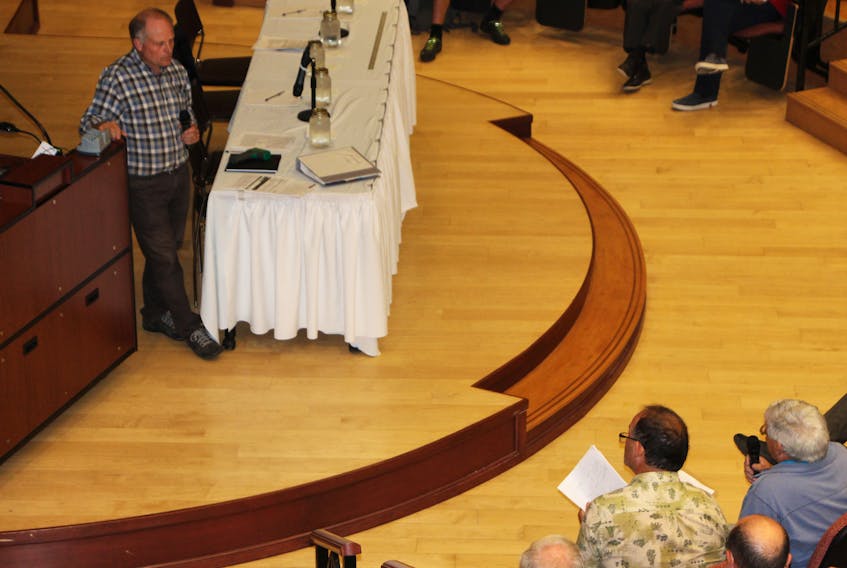ANTIGONISH, N.S. — It was a public engagement session which involved a lot of public – a virtually full Schwartz School of Business auditorium – and strong engagement, considering the scheduled two-hour event went closer to three hours.
The Aug. 13 event was a panel discussion regarding the proposed commercial oyster farming operation on Antigonish Harbour, and was sponsored by St. F.X.’s aquatic resource program, faculty of arts and faculty of science.
The discussion was chaired by aquatic resources program co-ordinator David Garbary and featured as panelists; the proponent of the operation Ernie Porter from Town Point Consulting, Friends of Antigonish Harbour representatives Frank Gallant and Greg MacGillivray who expressed grave concerns about the proposed farm, St. F.X. biologist Tony Miller who spoke to the natural history of the harbour, and Paqtnkek Mi’kmaw Nation Elder Kerry Prosper who provided not only a First Nations’ perspective but a broader one as well.

Garbary started the evening out with noting the provincial regulations in place regarding such a proposal and then both Porter and the Friends of Antigonish Harbour representatives were given a half-an-hour to state their sides, followed by Miller’s and Prosper’s words. All panelists maxed out their allotted time and the evening concluded with a lively question-and-answer session, with most questions selected to be read and answered during the session – selected due to time restraints - directed to Porter.
“I was really pleased with the turnout; it’s really important that the public has an opportunity to hear the details straight up without any monkey business,” Porter said at the conclusion of the event.
“I thought the crowd was very attentive and wanted to learn the details. I thought the questions were great and I was particularly pleased Kerry Prosper came and gave us some guidance in a broader way; his words were very wise and we should all take heed in thinking more globally.”
Being pleased with the turnout was one area Friends of Antigonish Harbour representative Gallant agreed with Porter.
“We were really pleased, for sure, to see so many people come out,” Gallant said.
“The goal of the evening was to have a panel discussion to allow people to have information which is now going to allow them to go back to their homes and to their neighbours and friends to continue the conversation about what they like or dislike about this whole situation; and to see where they can gain some more information because, clearly, there are some things, as was stated tonight, some contradictory evidence.”
As for where Porter and his proposal goes from here, he said the public engagement continues.
“It’s a big process,” he said. “We’re trying to reach out to every stakeholder we should talk to. We still need more feedback, engagement with the lobster fishers; they’ve been very busy, even after the lobster season when they went into other work.
“And still we have more data to collect from the sites in order to craft the final farm design and write the whole development plan, fill in the application, hold a public meeting and get our application in.”
RELATED STORY:
Antigonish oyster farm proposal draws heat
Porter talked about dealing with questions that are speculative in nature, like many during the evening, and might only be answerable once a farm is operational.
“I’m not frustrated by that; I expected there to be questions that are unanswerable. That’s partly a strategy by opponents to throw off an applicant and partly some questions are difficult to answer at this stage of the game. So not frustrated, not surprised, it’s par for the course,” he said, noting his goal is to be as open and transparent as possible.
“Not only is that a requirement of the process, but we need to, along the way, earn social license to operate this facility in harmony with the other stakeholders and we can only earn that if we’re respected, if we’re seen to be open and honest,” he said. “And, right now, it’s a high hill to climb because of all the misinformation which has gone out and the strident attempts by our opponents to stand in our way.”
Gallant said it’s important that, during public consultations, the information and reporting isn’t just provided by the proponent.
“We have 12 to 15 points we have put together for the minister about aspect of the process that makes it too bias; this is evidence that the government of Nova Scotia wants to do aquaculture,” he said, noting their group is “in favour of that.”
“But do a better analysis of all of the harbours; where should they [farms] exist? Don’t let a guy pick out a spot in front of his home and say here is a good spot. Let’s think about where these things could be, create the economic development where they’re safe to be, and as my colleague [MacGillivray] said tonight, we would love to see oyster aquaculture, we would like to see it in certain spots, we would like to see and continue to see the harvesting of small leases on the harbour because it’s more sustainable.”
Gallant noted his group is using their Facebook page to gather as much scientific information as they can on the proposal.
“We have three or four well connected people in our group who are linked to scientists from all over Atlantic Canada, and we certainly want to make sure we’re using Atlantic Canada based evidence because it’s no good going to the States or somewhere else,” he said. “We have our own special eco-system here and that has been a concern of ours.”










